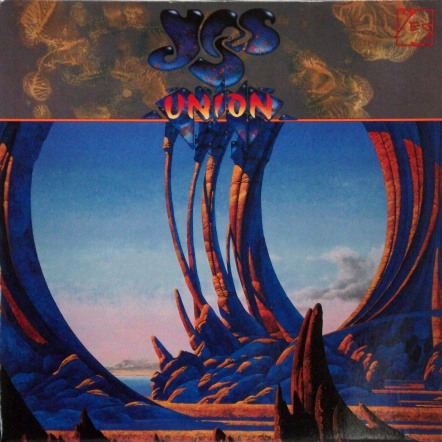In April 2016 I wrote an anniversary piece on this album which is still dear to me for various reasons.

Let’s see … “Big Genitalia” is in here … and so is “Anderson, Walkman, Buttholes and How”. Best have “Onion” as well – it is its 25th anniversary after all – and complete the triplet of albums that ruined the band Yes forever. All of this and none of it is true.
“I call it “Onion” because it makes me cry every time I listen to it.” (Rick Wakeman)
“No idea how this is supposed to work. We’re getting roadies but what we need is referees.” (Trevor Rabin)
“@#•Ø√~µ‚ƒ©«Ù¥fi]|¶{º|¡fiƒ{!!!!!!!!!!” (Steve Howe)
Ah, “Union”. The union that never was, hated by the band, its fans and most of the western hemisphere. The veritable Frankenstein of an album that well displays what happens when managers, execs and producers are given too much rope. The audio equivalent of the kitchen sink syndrome. The definition of corporate rock excess at its worst. There is no collaboration on display here, let alone any communal band playing to the point that it becomes indecipherable as to who actually did what. The albatross with the wings of a turkey and/or vice versa. Again, all of this and none of it is true.
There are many accounts on how this creat__ ure came about and eventually led to the supra-Yes octet in 1991. I will try a cursory overview for the sole purpose of completeness. When Jon Anderson, Bill Bruford, Rick Wakeman and Steve Howe (hereafter: ABWH) ran into trouble during the writing of their sophomore album the remaining quartet of what was still the official Yes – namely Chris Squire, Trevor Rabin, Tony Kaye and Alan White (hereafter: YesWest) casually demoed albums‘ worth of new material with new vocalists in mind (these were potentially to be Roger Hodgson of Supertramp, future alumnus Billy Sherwood, a returning Anderson or even Rabin/Squire themselves). None of these two endeavours came to any fruition and produced a veritable clusterfuck of disparate bands, ungainly material and huge loss of credibility to what used to be two very successful ventures: the return of the original name with a modern and tight 1980’s sheen and the subsequent reboot of the old band ethos with a contemporary world music slant (ABWH). Although nobody managed to see eye to eye any longer – least of all the corporate lobbyists attached – something had to be done and this album, to me anyway, is a logical result (read this account by producer Jonathan Elias for an idea about just how pear-shaped things became).
But I digress. “Union” is nowhere as bad as it seems. Somehow things just had to happen as they did.
Every time I listen to this album I perform a magical trick: I erase all the business bullshit, the multitudes of session musicians drafted in to replay flawed performances, the overproduced assault on all senses, the iffy song material and the general pettiness of its motivation. I am entirely unskilled in the creation and execution of music – indeed, I have little intention to ever achieve this – but I trust my ears and the increasingly malleable bit of brain mass in between – and they tell me that this is an album that was conceived for all the wrong reasons but, in turn, became finalised for all the right reasons. At strictly face value this was and is an exciting release. Once more, all of this and none of it is true.
There are overproduced atrocities such “Dangerous” or (to a lesser extent) “Holding On” to decry (even by their respective titles); likewise there are moments of serene and cerebral beauty such as the eerie Anderson/Wakeman duet “Angkor Wat” (replete with Cambodian recitation) and “Take the Water to the Mountain” which display well that ABWH themselves did have a distinct identity; much to the chagrin of its participants which were to see it sacrificed at the altar of “Union”. The openers “I Would Have Waited Forever” and “Shock To The System” as well as “Without Hope” and “Silent Talking” pass as credible takes on a modernised Yes that combines the flamboyance of the past with the succinctness of their later trajectory. I could not really care less whether that is Steve Howe or his ghostplayer Jimi Haun on guitar, whether that really is Rick Wakeman tinkling the ivories or Steve Porcaro or anyone else to be found in the small print. Having their respective stylistic at best as little vignettes or functional pockets does the music nothing but good and serves the principle of modernisation better than the hitherto desperate search for another “Owner of a Horse and Cart” (which, in all truthfulness, remains both an oddity and an industrial accident in the band’s catalogue anyway). Now, over to YesWest …
As expected, the four songs by the Rabin/Squire-led version of the band make it easier for the listener. As on “90210” or “Big Generator”, they display the stately, at times slightly bland AOR windowdressed by Rabin’s shred-prog excursions and their intricateness-defying wall-of-sound construction. While the cod white-reggae of “Saving My Heart” isn’t really worth anyone’s time, the pretty “Lift Me Up” represents the above well and even yielded a minor hit for the band at the time (replete with a video clip featuring the full ensemble). I do like “Miracle Of Life” with its busy, harmony-fuelled instrumental opening with Kaye’s patented Hammond stabs forming a bedrock to Rabin’s industrious arpeggiated riffing very much – shame that the ensuing song falls back to his aforementioned compositional mode. Squire’s atmospheric “The More We Live” (his first of many collaborations with Billy Sherwood, who is now his rightful successor in the band after his passing in 2015) has evolved as a perennial fan favourite, on which merits Sherwood still argues his cred as a rightful member of Yes. These four are never less than satis-factory tracks, however, ABWH as an entity exercises hegemony over this release which makes them look as being shoehorned into the entire package – which is a bit sad.
Honourable mention to Howe’s acclaimed acoustic guitar composition “Masquerade”, which, once more, displays his unique sense of dextrous melodicism and the oddball “Evensong”, a duet by Bill Bruford and Tony Levin; probably the closest that Yes ever got to incorporating King Crimson (apart from Anderson’s guest feature on “Islands”). These, along with “Angkor Wat”, pass as verified solo features and reclaim some “Fragile”-oriented credibility for this aural white elephant that no-one claims to like.
Now, the you-had-to be-there scenario. The tour became one of the highest grossing in what turned out to be a recessional year for the live concert market. For the discerning fan it was like Christmas, Easter and a summer boozer rolled into one. Don’t let anyone tell you otherwise. Hey, it yielded my first ever printed gig review. There was Wakeman, weaving his delusions of grandeur while acting like a goof whenever possible. There was Kaye doing his serviceable minimalism alongside. There were Rabin and Howe, forever in each other’s way but getting on with it nonetheless. Bruford and White: a perfect match of percussive onslaught with Bruford just sitting back and having a good time while leaving White to do the heavy lifting. Anderson and Squire, cajoling around each other, searching for middle ground … and finding it by the time “Awaken” reduced the audience to a shivering mass of multiple epiphanies. It never worked. It was nothing but bloated grandiosity with the obvious faults on display rendering it human. It couldn’t last. What is not to like?
Cunning plan. Good album. Fantastic tour. Happy 25th, “Union”. Now, remain where you are. Please.
PS: Of course, “Big Genitalia” is not part of this blog, because this article had initially been written for another one of my outlets. Neither do I claim ownership of all the included offences, slurs and title spoofs. In that respect, ask the true fans! – and go see ARW when they come to town. Or RAW. Or WAR …


